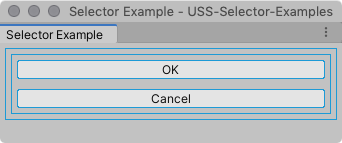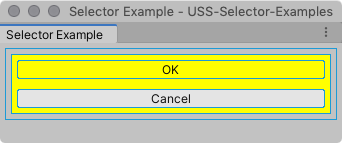Class selectors
USS class selectors match elements that have specific USS classes assigned. USS class selectors are analogous to CSS class selectors.
Syntax
A class selector consists of the class name prefixed with a period. Class names are case-sensitive and can’t begin with a numeral.
.className { ... }
Only use a period when you write the selector in a USS file. Don’t include it when you assign the class to an element in a UXML or C# file. For example, don’t use <Button class=".yellow" />.
In general, don’t include a period in class names. Unity’s USS parser interprets a period as the beginning of a new class. For example, if you create a class called yellow.button, and create the following USS rule: .yellow.button{...}. The parser interprets the selector as a multiple selector, and tries to find elements that match both a .yellow class and a .button class.
When an element has more than one class assigned, a selector only has to match one of them to match the element.
You can also specify multiple classes in a selector, in which case an element must have all of those classes assigned in order to match. See Multiple selectors for details.
Example
To demonstrate how simple selectors match elements, here is an example UI Document.
<UXML xmlns="UnityEngine.UIElements">
<VisualElement name="container1">
<VisualElement name="container2" class="yellow">
<Button name="OK" class="yellow" text="OK" />
<Button name="Cancel" text="Cancel" />
</VisualElement>
</VisualElement>
</UXML>
With no styles applied, the UI looks like the following:

The following name class selector style rule matches the element container2 and the button element OK, and changes their background to yellow.
.yellow {
background-color: yellow;
}
The UI looks like the following when you apply the style:
